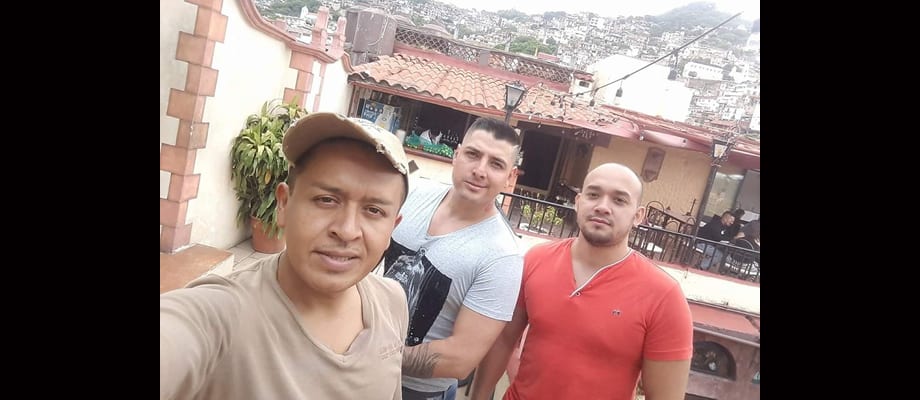
From left: Rubén Estrada, Roberto Vega and Carlos Uriel López were murdered in Taxco, Mexico, on June 17, 2018. An activist in the state of Guerrero with whom the Washington Blade spoke said Estrada, Vega and López were killed after a group of men tried to extort money from them at a local nightclub. (Photo courtesy of Gaby Soberanis/Diversidad Guerrero)
Michael Lavers | Washington Blade
Courtesy of the National LGBT Media Association
Three well-known LGBTI rights advocates in the Mexican state of Guerrero were killed over the weekend. Authorities on Sunday, June 17, found the bodies of Rubén Estrada, Roberto Vega and Carlos Uriel López in Taxco, a city between the state capital of Chilpancingo and Mexico City that is popular with tourists.
Estrada, 35, was the main organizer of Taxco’s annual Pride march and a local gay beauty contest. Vega and López, who was his partner, were also activists.
Gaby Soberanis, president of Diversidad Guerrero, an LGBTI advocacy group that is based in the resort city of Acapulco, on Monday, June 18, told the Washington Blade during a telephone interview that Estrada, Vega and López were at a local nightclub early Sunday morning when a group of men tried to extort money from them.
Soberanis said Estrada, Vega and López refused to give them any money. She told the Blade the men returned, forcibly removed them from the nightclub and placed them into a van.
Authorities found their bodies a few hours later on a dirt road near the main highway between Mexico City and Acapulco.
A local newspaper published a picture of one of the murdered activists who appeared to have been shot in the back of the head. Another local media report indicates Estrada, Vega and López had been tortured before they were killed.
“We are sad, depressed,” Soberanis told the Blade. “They were young. They had a future ahead of them. The entire state’s LGBTI rights movement is sad, is in mourning.”
Other activists across Mexico also mourned their deaths.
“The loss is for a society that demands equality, freedom and an end to violence,” said Lol Kin Castañeda, a lesbian activist who is a member of the Mexico City Constituent Assembly in a tweet that tagged Guerrero Gov. Héctor Astudillo. “We demand justice.”
Local media reports say the manner in which Estrada, Vega and López were killed indicates they were victims of criminal gangs that operate throughout Guerrero.
“I don’t know if it was a hate crime based on homophobia,” Soberanis told the Blade.
Violence based on sexual orientation and gender identity remains commonplace throughout Mexico.
Drug cartels and criminal gangs that operate throughout Guerrero have made it one of the most violent states in the country. An advisory the State Department issued on March 16 urges U.S. citizens not to travel to Guerrero and the states of Colima, Michoacán, Sinaloa and Tamaulipas “due to crime.”
A group of 43 college students known as “normalistas” disappeared in Iguala, a city that is roughly an hour south of Taxco in Guerrero, on Sept. 26, 2014.
Mexican authorities have accused former Iguala Mayor José Luis Abarca and his wife, María de los Ángeles Pineda, of masterminding the kidnapping. The Associated Press reports Abarca allegedly ordered local police officers to turn the students over to members of a local criminal group who killed them.
The election to choose the successor to President Enrique Peña Nieto, who cannot run for a second term under the Mexican constitution, will take place on July 1. Violence and corruption are among the top issues for Mexican voters.
















This is a sad story coming out of Mexico. Taxco, Guerrero, México, is a city known for its silver and is located southwest of Mexico City, a city where many tourist go to purchase their silver jewelry.
The other sad part that of these murders is that they fall less than a week before Mexico City has México’s, and Latin America’s, biggest LGBT PRIDE Parade, Saturday, June 23. México City this year celebrates 40 years of having a parade and progress and then this homophobic crap happens.
These murders do dampen the parade excitement a bit and gives pain to our LGBT community here, but with 1,000,000 LGBT people expected to march in this year’s parade, obviously we are not going away and our fights and struggles for justice and equality continues: not only in México, but everywhere.